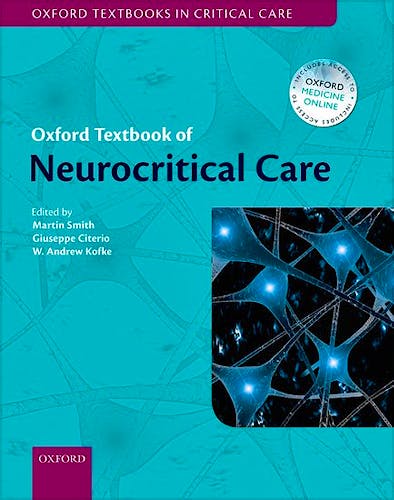

No hay productos en el carrito



Oxford Textbook of Neurocritical Care
Smith, M. — Citerio, G. — Kofke, W.
1ª Edición Febrero 2016
Inglés
Tapa dura
456 pags
1312 gr
23 x 28 x 2 cm
ISBN 9780198739555
Editorial OXFORD
LIBRO IMPRESO
-5%
176,44 €167,62 €IVA incluido
169,65 €161,17 €IVA no incluido
Recíbelo en un plazo de
2 - 3 semanas
Description
The critical care management of patients with life-threatening neurological conditions requires the ability to treat neurological injuries, manage medical complications and perform invasive procedures whilst balancing the management of the brain and the body. The Oxford Textbook of Neurocritical Care provides an authoritative and up-to-date summary of the scientific basis, clinical techniques and management guidelines in this exciting clinical discipline.
This highly authoritative textbook is conceptually divided into three sections. Section 1 provides an accessible guide to the general principles of neurophysiology and neuropharmacology, cardiorespiratory support, management of fluids and intracranial hypertension. Section 2 outlines the use of multiple monitoring modes which are crucial to diagnosis and management. Section 3 covers the management of the major pathologies encountered during neurointensive care with an emphasis on evidence-based practice or consensus guidelines to provide a cohesive and definitive clinical resource.
Authored by an international team of expert practitioners this textbook reflects world-wide practice and guidelines. This volume is published with a concurrent online version, which features access to the full content of the textbook, contains links from the references to primary research journal articles, allows full text searches, and provides access to figures and tables that can be downloaded to PowerPoint RG.
Designed for consultants and trainees in neurocritical care, The Oxford Textbook of Neurocritical Care is also accessible to the general critical care physician and trainees who need a definite and authoritative resource to meet the unique needs of neurocritically ill patients.
- Extensive coverage of the field including neurophysiology and neuropharmacology, monitoring and the management of specific problems
- Authored by international experts in the field, presenting a comprehensive world view
- Published in concurrent print and online versions to enhance the learning experience
- The online version allows access to the full content of the textbook, contains links from the references to primary research journal articles, allows full text searches, and provides access to figures and tables that can be downloaded to PowerPointRG.
Contents
Part 1 General Principles
1. Introduction to neurocritical care, Martin Smith
2. Applied neuropathophysiology and neuropharmacology, RajaNandini Muralidharan
and W Andrew Kofke
3. Cerebral blood flow physiology, pharmacology and pathophysiology, Chandril
Chugh and W Andrew Kofke
4. Cardiorespiratory support in neurologic critically ill patients, Paolo Pelosi,
Maria Vargas, and Iole Brunetti
5. Fluid management, Jonathan Ball
6. Sedation and analgesia in the neurocritical care unit, Mauro Oddo and Luzius
A Steiner
7. Intracranial hypertension, Andrea Lavinio
8. Ethical and legal issues in neurocritical care, Leslie M Whetstine, David
W Crippen, and W Andrew Kofke
Part 2 Monitoring
9. Intracranial pressure monitoring, Federico Villa and Giuseppe Citerio
10. Monitoring cerebral blood flow, Chandril Chugh and W Andrew Kofke
11. Cerebral oxygenation monitoring, Matthew A Kirkman and Martin Smith
12. Brain tissue biochemistry, Imoigele Aisiku and Claudia Robertson
13. Multimodal brain monitoring and neuroinformatics, Hooman Kamel and Claude
Hemphill III
14. Electrophysiology in the intensive care unit, Neha S Dangayach and Jan Claassen
15. Neuroimaging, Yanrong Zhang, Peter Komlosi, Mingxing Xie, and Max Wintermark
Part 3 Specific Conditions
16. Postoperative care, Nicolas Bruder and Lionel Velly
17. Traumatic brain injury, Hayden White and Bala Venkatesh
18. Subarachnoid haemorrhage, Pouya Tahsili-Fahadan and Michael N Diringer
19. Intracerebral haemorrhage, Candice Delcourt and Craig Anderson
20. Acute ischaemic stroke, Barry M Czeisler, Daniel Sahlein, and Stephan A
Mayer
21. Traumatic spinal cord injury, Jefferson R Wilson, Newton Cho, and Michael
G Fehlings
22. Neuromuscular disorders & acquired neuromuscular weakness, Nicola Latronico
and Nazzareno Fagoni
23. Status epilepticus in adults, Jan Novy and Andrea O Rossetti
24. Central nervous system infection and inflammation, Erich Schmutzhard, Ronny
Beer, Raimund Helbok, and Bettina Pfausler
25. Post cardiac arrest sydnrome, Jerry P Nolan
26. Disorders of consciousness, Olivier Bodart, Aurore Thibaut, Steven Laureys,
and Olivia Gosseries
27. Non-neurological complications of acquired brain injury, Derek J Roberts
and David A Zygun
28. Electrolyte and endocrine disturbances, Adikarige Haritha Dulanka Silva,
Antonio Belli, and Martin Smith
29. Brain death, Jeanne Teitelbaum and Sam Shemie
30. Principles of organ donation, Ivan Rocha Ferreira da Silva and Jennifer
A Frontera
31. Outcome after neurointensive care, Lakshmi P Chelluri and Jayaram Chelluri
Authors
Martin Smith, The National Hospital for Neurology and Neurosurgery, Consultant and Honorary Professor in Neurointensive Care, W. Andrew Kofke, Hospital of the University of Pennsylvania,, Professor of Anesthesiology and Critical Care,Guiseppe Citerio, San Gerardo Hospital, Monza, Italy, Director of Neuroanesthesia and Neuro Intensive Care
© 2026 Axón Librería S.L.
2.149.0